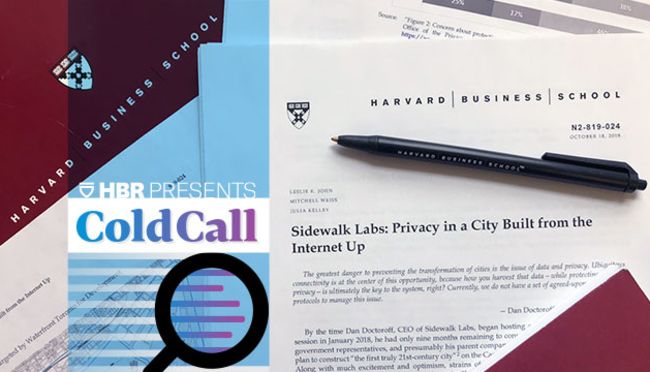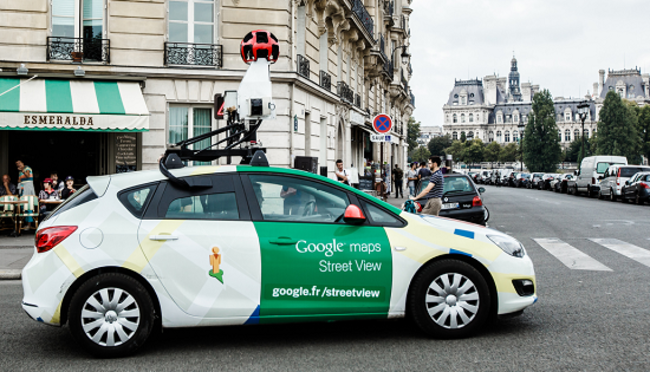Urban Development →
→

- 17 Apr 2019
- Cold Call Podcast
Would You Live in a Smart City Where Government Controls Privacy?
Toronto is experimenting with smart-city concepts envisioned by Google spinoff Sidewalk Labs. Leslie John and Mitch Weiss discuss the tradeoffs of using technology to improve modern city life. Open for comment; 0 Comments.

- 23 May 2018
- Research & Ideas
How to Know If Your Neighborhood Is Being Gentrified
Using modern digital tools, Michael Luca and colleagues hope to give urban planners a look into gentrification as it is happening. Open for comment; 0 Comments.

- 26 Apr 2018
- Cold Call Podcast
Why JPMorgan Chase Is Investing Millions in Detroit
JPMorgan Chase is making extensive investments into the revitalization of Detroit. What does it expect in return? Professor Joseph Bower and JP Morgan executive Peter Scher discuss the challenges and rewards of partnering with cities in this podcast. Open for comment; 0 Comments.

- 04 Apr 2018
- Research & Ideas
Smart Cities are Complicated and Costly: Here's How to Build Them
When governments take on a smart city project, it's often the private sector that's left to execute the vision—sometimes at the expense of good public policy. John Macomber proposes a roadmap that considers situation, solution, and sovereignty. Open for comment; 0 Comments.

- 06 Nov 2017
- Research Event
Who is Responsible for the Future of Cities?
As technological innovations continue to transform urban growth, many believe the private sector should lead the future of cities—and that government regulators should follow its lead. But in a recent cross-disciplinary panel at Harvard, not everyone agreed. Open for comment; 0 Comments.

- 16 Aug 2017
- Research & Ideas
Researchers Use Google Street View to See the Future of Cities
Scott Duke Kominers, Nikhil Naik, and colleagues use Google Street View to show how cities are changing and help them improve over time. Open for comment; 0 Comments.

- 18 Feb 2016
- Working Paper Summaries
Urbanization with Chinese Characteristics? China’s Gamble for Modernization
If the Chinese Communist Party has its way in the coming decades, it will urbanize hundreds of millions of people, transform agriculture, and sustain economic growth--all without political instability. This paper details the risks and opportunities of China’s new-style urbanization reforms, arguing that proposals for urbanization and economic transformation are not a radical departure from the institutions that have structured Chinese society for the last 30 years.

- 10 Feb 2016
- Working Paper Summaries
Land Institutions and Chinese Political Economy: Institutional Complementarities and Macroeconomic Management
This paper shows the ways in which the Chinese Communist Party (CCP) has used land as a policy tool. CCP leaders intentionally reorganized fiscal, financial, and land institutions to put land at the center of local government finances in the mid-1990s. Since the late 1990s, the CCP has used the land supply as a key tool of macroeconomic expansion and contraction. Local officials act as agents of the center: pursuing land development when pushed to so do by central authorities concerned about managing economic growth.

- 09 Dec 2015
- Working Paper Summaries
Big Data and Big Cities: The Promises and Limitations of Improved Measures of Urban Life
Michael Luca, Scott Duke Kominers and colleagues describe a number of new urban data sources and illustrate how they can be used to improve the study and function of cities.
- 14 Mar 2011
- Research & Ideas
Water, Electricity, and Transportation: Preparing for the Population Boom
By 2050, the world's cities will have to support 3 billion more inhabitants, mostly in developing countries, with crucial investments needed in three areas: water, energy, and transportation. Several of the planet's top city planning and environmental business experts gathered at Harvard Business School earlier this month to discuss available options. Closed for comment; 0 Comments.
- 15 Mar 2010
- HBS Case
Developing Asia’s Largest Slum
In a recent case study, HBS assistant professor Lakshmi Iyer and lecturer John Macomber examine ongoing efforts to forge a public-private mixed development in Dharavi—featured in the film Slumdog Millionaire. But there is a reason this project has languished for years. From the HBS Alumni Bulletin. Closed for comment; 0 Comments.

When Climate Goals, Housing Policy, and Corporate R&D Collide, Social Good Can Emerge
Grants designed to improve housing can make homes more energy efficient and save money for low-income families, providing a powerful way to confront climate change, says research by Omar Asensio. What do the findings mean for companies trying to scale innovation?